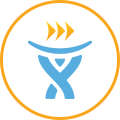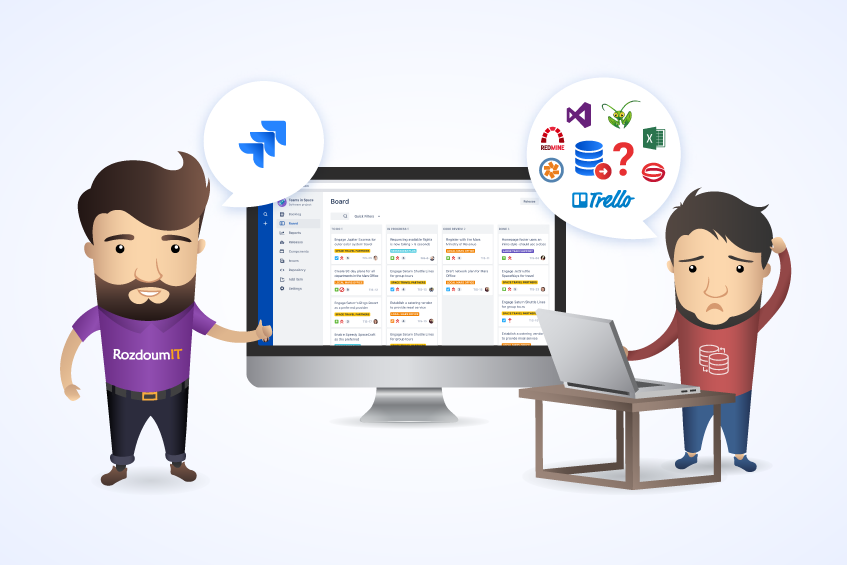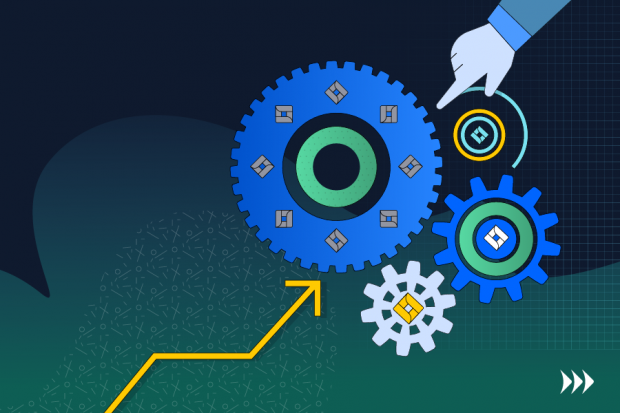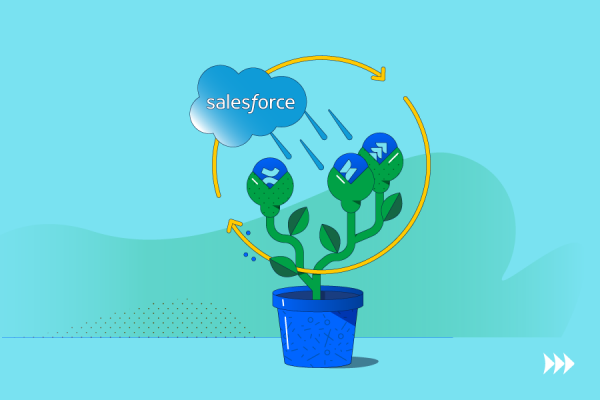All Articles
Jira vs. TFS: Synergy of Tools Against Full Integration

Atlassian Team at Rozdoum
When that moment arrives and you need to choose the correct management tool, an abundance of factors may just freeze your will. It may be confusing, trying to consider all the factors, especially when some of them are incomparable. We can not provide you with a universal remedy, but we can offer some sound advice on how to make the decision between Jira or TFS.

Management model matters
Define the requirements. What do you need the tool for? Shall it be Application Lifecycle Management, Project Management or an Issue Tracking System? Even if you are not sure, make your uncertainty a demand. Both Jira and TFS are software development tools.
The Team Foundation Server is a set of tools combining several functions including version controlling, an agile processes manager, an issue tracker, and the support of different platforms for development. It means that no matter what your needs are, you get the full set of integrated tools.
Jira is the family of products each intended for a specific task: Jira Software — issue tracking, Jira Core — project management, and Jira Service Desk — customer service. Moreover, Jira is a part of the Atlassian bundle of products that can be assembled as modules and organized into combinations that best suit your needs. It means that even if your conditions change, you can use a separate tool or mix the Atlassian products to tailor them to your demands.
Visualization of all processes is the main advantage of Jira. It is really advantageous with all those customizable boards: Agile, Scrum, Kanban, and Sprint-based views. The dozen of charts, diagrams, and reports are available to make sure you do not miss anything.
Integration is the key benefit of TFS, so you get several tools as one system.
Can you afford the tool? (Affordability)
Atlassian products can affirm its flexibility even in their pricing policy. The trial period is free and lasts from 7 to 30 days. Depending on the product type, the number of users and its hosting, the price may be as low as $10 per month.
TFS offers usage with limited functionality for free, and full functionality for paid usage starting from $6 per month.
Pricing for both tools depends on the number of users: the bigger the number, the higher the price. To make your decision more distinctive don’t forget to include maintenance and operational costs into your estimations such as hosting and support.
Life is changing (Scalability)
Both TFS and Jira, have different hosting opportunities that match up with a different number of users. The tools may be cloud-hosted for small teams. You may host the management system on your own server, but that means you should have one to begin with and consider the cost of it as well as operational expenses. The enterprise solution is available for the Jira family, and there are plans that may serve an almost unlimited number of users. Usually, it is the data center that hosts enterprise products. Actually, TFS itself does not have an enterprise version solemnly, you just pay for the users as it is. Also, you should note that TFS is an on-premise solution. To have a cloud-hosted service you would be offered to migrate to the Visual Studio Team Server (VSTS).
A bit more on Jira scalability: it works backward. It does not only extend the tool as soon as your business starts growing, but it is also possible to move from bigger to smaller, agilely fitting the tool to meet your more narrow or smaller demands.
Flexibility
With TFS, users have two levels of access to its features: free use and paid access. A free version provides you with only minimum functionality, or you can pay for an integrated tool and receive all the benefits that it has to offer. In either case, it is a pre-set number of features, and you can only choose from two options. It is simple but inflexible.
Within Jira’s family, you have different products to start from: Jira Core, Jira Software, and Jira Service Desk. Furthermore, there is a whole bundle of Atlassian products for your team’s communication, code version control, documentation management, as well as integration and release management: Statuspage, Confluence, Hipchat, Trello, Bitbucket, Sourcetree, and Bamboo. You can choose the products you really need, and abandon the ones that are not an essential part of the project.
Think about your developers, define their needs and ask for their opinions because the tools are pretty much the same. The key difference is that mod TFS supports the following IDEs: Eclipse, IntelliJ, Android Studio, and Visual Studio Code. Jira has IDE Connectors for IntelliJ, Visual Studio, and Eclipse. Both software development systems support several repositories, languages, and platforms. The two aforementioned work with native mobile support. There is, of course, a large difference in functionality. Let your team choose what is best for them and for you.
Extendability
TFS has extensions to add some functionality to the tool. Ready-to-use solutions are available in the Marketplace. As an option, you can order your custom solution, or even develop it yourself.
Jira’s functionality may be extended with apps downloaded from the Atlassian Marketplace. Right now 2,585 apps are available there, and your developers may use APIs to build apps and plugins to tailor Jira’s functions to your business processes.
Jira is focused on automation and there are many plugins that satisfy the user’s most frequent requirements. For example, an import plugin to transfer data from other software development management tools.
Conclusion
Below is the table to sum up some points of comparison between Jira and TFS.
Define your needs, estimate your expenses, consider the benefits and decide for yourself.
The last thing that we would like to mention is that Atlassian is human-oriented, instead of product-based. Atlassian has a university for those who like to discover, and a certification program for those who need to prove their abilities. They have support, tons of documentation, blogs and communities of advocates.
As for us, we are Atlassian-driven because these products’ flexibilities and functionalities allow us to make every business process manageable. We use standard Atlassian solutions to run our company’s processes and enhance them with self-built apps. For our customers, we create Atlassian apps to solve their specific tasks and we are an official app Vendor. Our competence covers all areas. We use Atlassian, we build Atlassian, we serve Atlassian, we train Atlassian, and we gained the Atlassian Solution Partner status.
| Jira | TFS | |
| Management models |
|
|
| Hosting |
|
|
| Scalability |
|
|
| Pricing |
|
|
| Flexibility |
|
|
| Extendability |
|
|
| IDE |
|
|
| API |
|
|
| Repositories |
|
|
| Mobile |
|
|
P.S. Still have doubts, can’t define between Jira and TFS, need an advice, or do not know how to Migrate data from your system to Jira? We are here to help you.

Atlassian Team at Rozdoum

Stay on Top of the Latest IT Software Development Tips, Newest Offshore Trends, and Best Outsourcing Practices.
Related Posts

Integrating Platforms
Managing Projects in Multiple Jiras: Best Tools and Practices
Jira is one of the most popular project management solutions, which is specially designed for Agile software teams. Here is how you can manage projects in multiple Jiras effectively.

Integrating Platforms
How to Control Your Project Budget?
US’ 1977-1980 Secretary of State, Cyrus Vance, once said: “Any military project will take twice as long as planned, cost twice as much, and produce only half of what is wanted.”

Integrating Platforms
Jira and Salesforce Integration
A modern digital company often has a large stack of various CRMs, time-trackers, risk and budget control tools, and so on.